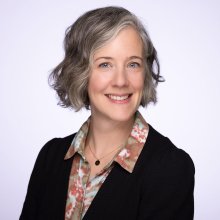Dr. Allison Gonsalves
DISE Graduate Thesis Programs (M.A. and Ph.D.)

- Sociocultural studies of science education, science identities, qualitative and narrative methods
I teach graduate and undergraduate courses on secondary science teaching methods and sociocultural issues in math and science education. I am currently the Director of Graduate Programs in the Department of Integrated Studies in Education, and the Director of the Science Education Laboratories in the same department. I am the co-chair of the European Science Education Research Association’s Science Identities Special Interest Group, and I serve on the editorial board of both the Journal for Research in Science Teaching and Gender & Education.
My research is motivated by pressing concerns about the unequal access that many historically under-represented groups (such as women and people of colour) in Science, Technology and Engineering (STE) disciplines face, and the concomitant privilege that these disciplines have in contemporary society. My research seeks to understand processes of inclusion and exclusion in STE education through the lens of “science identities”. I carry out this research with students in post-secondary STE contexts (involving graduate students in physics programs, undergraduate science majors and novice teachers in teacher education programs), and in out-of-school-time (OST) contexts (e.g., after-school programs in community centres and schools with youth). My current research program involves the tracing of "science identity trajectories" across learning spaces and the affects and experiences that shape these movements. My current funded research projects entail mapping students’ affective engagement in equity and sustainability initiatives on campus, and the impacts this has on their identity work in and beyond science learning.
- PhD, Curriculum Studies (Science Education), McGill University, Canada
- M.Sc, Molecular Biology and Genetics, University of Guelph, Canada
- B.Sc (Hons), Genetics, University of Western Ontario, Canada
- Heather Reisman and Gerald Schwartz Award for Excellence in Teaching, Faculty of Education, McGill University, 2020
- 'Gonsalves, A., Danielsson, A., Avraamidou, L., Nyström, A-S., and Esquivel, R. (2023). Using story-based methodologies to explore physics identities: How do moments add up to a life in physics? Physical Review Physics Education Research. 19, 2. DOI: 10.1103/PhysRevPhysEducRes.19.020106
- Gonsalves, A., Danielsson, A., Johansson, A., Nyström, A-S. (2022). Other spaces for youths’ identity-work in physics. Physical Review Physics Education Research. 18, 020118.
- Rahm, J., Gonsalves, A., Lachaîne, A. (2022). Young women of color figuring science and identity in within and beyond an afterschool science program. Journal of the Learning Sciences. 31, 2, 199-236. DOI: 10.1080/10508406.2021.1977646
- Gonsalves, A., Cavalcante, A., Sprowls, E., and Iacono, H. (2021). “Anybody can do it if they’re brave enough”: Understanding the role of science capital in science majors’ identity trajectories into and through post-secondary science. Journal of Research in Science Teaching. 58, 8, 1117-1151. https://doi-org.proxy3.library.mcgill.ca/10.1002/tea.21695
- Ottemo, A., Gonsalves, A., and Danielsson, A. (2021). (Dis)embodied masculinity and the meaning of (non)style in physics and computer engineering education. Gender & Education. 33,8, 1017-1032. DOI: 10.1080/09540253.2021.1884197
- Gonsalves, A., and Danielsson, A. (2020). (Eds) Physics Education and Gender: Identity as an Analytic Lens for Research. Springer Press. (183 pgs). https://link-springer-com.proxy3.library.mcgill.ca/book/10.1007/978-3-03...
Not taking new students during the upcoming application period
